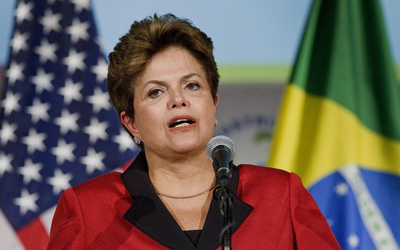Mount Everest hikers describe ‘extreme’ conditions as huge rescue effort continues
Brazil’s impeachment plot thickens

Bloomberg / Brazil’s President Dilma Rousseff.
Brazil’s impeachment plot thickened on Wednesday with speculation rife over whether President Dilma Rousseff will be abandoned by a key ally and the Supreme Court stepping in to put the whole process on hold.
For Ms. Rousseff, the court’s decision late on Tuesday to freeze the impeachment machine for a week offered badly needed respite as she fights to avoid being ejected one year into her second term at the head of Latin America’s biggest country.
And a meeting late on Wednesday with Vice-President Michel Temer, who has hinted strongly he will join the push to impeach, appeared to ease tension between the two.
Mr. Temer is from the centrist PMDB party, the main coalition partner for Ms Rousseff’s leftist Workers’ Party, and if he were to walk out on her, she would find it harder to get the one third majority needed in Congress to defeat impeachment.
Although Mr. Temer has kept a cryptic silence on his ultimate intentions, he has dropped strong hints that he no longer considers himself bound to his constitutional boss, including sending a letter on Monday to complain about her lack of trust in him.
Citing advisors, the Globo TV network reported that Ms. Rousseff and Mr. Temer decided that the issue of impeachment would not come up at their future meetings, that Mr. Temer would not have to make public statements supporting the government and that he would not work toward her impeachment.
Brazil’s first woman president, a moderate leftist, is accused of illegal budgeting manoeuvres, but says the practices were long accepted by previous governments. She calls the attempt to bring her down a “coup.”
The turmoil is stirring passions across the South American country of 204-million, where Ms. Rousseff’s Workers’ Party has been in power since 2003 with the help of the PMDB.
Nationwide opposition rallies are planned on Sunday and on Tuesday Ms. Rousseff supporters marched in central Rio de Janeiro, which will host the 2016 Olympics.
Political uncertainty is also adding to the economic mess, with gross domestic product down 4.5% in the third quarter year on year, and the national currency down a third against the dollar this year. A vast corruption scandal centred on state oil giant Petrobras has also put a hole in investor confidence.
In the latest sign of the dismal economy, the government announced year-on-year inflation for November of 10.48% — the highest in 12 years.
With that as a backdrop, rating agency Moody’s put Brazil’s sovereign rating on review for a cut to junk status on Wednesday, saying “worsening governability conditions and increased risk of policy paralysis” was one of the main drivers for the move.
The stock market in São Paulo, however, shot up 3.75% on speculation that Ms. Rousseff will be deposed, opening the door to ending months of political gridlock and launching economic reforms.
Late on Tuesday, the Supreme Court made a dramatic intervention, ordering a freeze until next Wednesday on the congressional commission that is taking a first look at Ms. Rousseff’s impeachment case.
The suspension was ordered in response to an appeal from Ms. Rousseff allies that the opposition had illegally insisted on secret votes — not the usual open ballots — while picking who would sit on the congressional commission.
The goal, according to the opposition, was to stack the body with anti-Rousseff deputies.
The commission is tasked with making a non-binding recommendation which would then set the tone for formal impeachment votes in the lower house and Senate on the president’s fate.
The court will rule next Wednesday on what to do, but is not expected to scupper the whole impeachment process.
In comments on Wednesday, Mr. Temer said the commission vote had been “legitimate” — another sign that he is shifting into outright opposition against Ms. Rousseff. If she is deposed, Mr. Temer would become interim president.
In parallel with Ms. Rousseff’s struggles, her main foe, the speaker of the lower house Eduardo Cunha, is also trying to save his career.
Mr. Cunha, from the PMDB’s openly anti-Rousseff wing, is the architect of the impeachment drive and also oversaw the controversial session on Tuesday to form the commission.
But in an illustration of the almost surreal level of corruption eating away at Brazil’s elite, Mr. Cunha himself faces criminal corruption charges that he took millions of dollars in Petrobras-related bribes and hid money in Swiss bank accounts.
On Wednesday, an ethics committee yet again postponed a decision on whether to open an inquiry into Mr. Cunha’s activities, which could then lead to him being forced out. It was the sixth such delay.
The conservative politician says the charges are politically motivated and has fought fiercely to retain his post. Analysts say that the entire impeachment crisis has in part been linked to Mr. Cunha’s battle to distract attention from his case and ensure his continued influence as speaker.












Leave a Reply
Be the First to Comment!
You must be logged in to post a comment.
You must be logged in to post a comment.